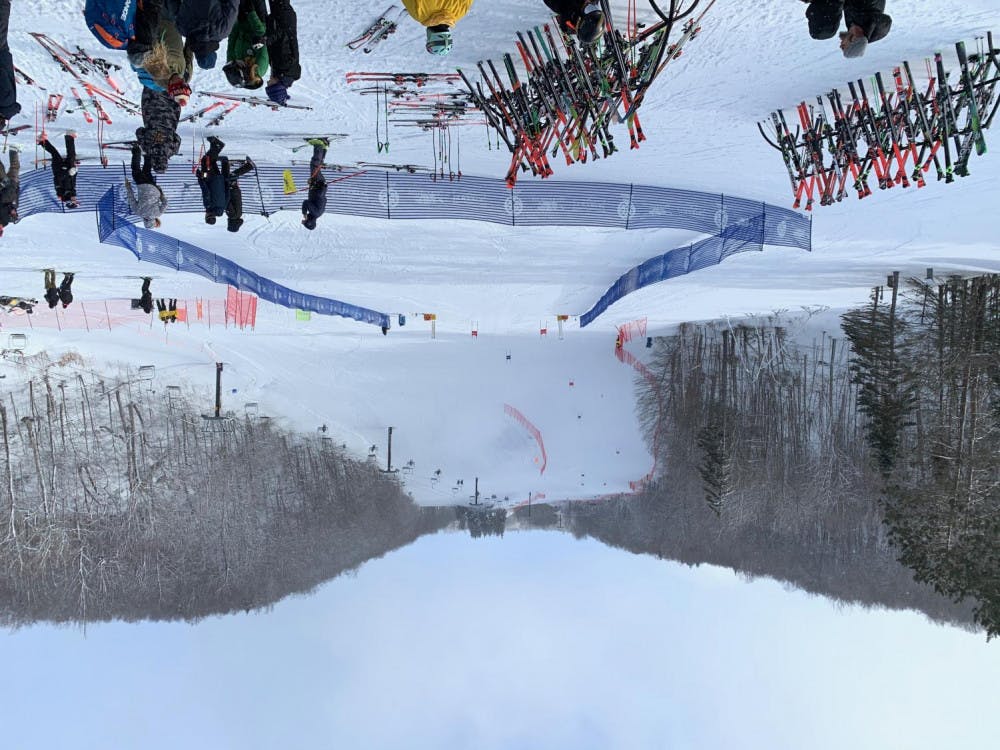The college’s ski areas at both the Snow Bowl and Rikert Nordic Center have cut their seasons short. Despite previous plans to stay open for the weekend of March 13, the ski areas had their last day of the season that Saturday — the day before Middlebury students were required to leave campus, and three weeks ahead of their planned closure date of Saturday, April 4.
“Making this about community safety was easy with respect to deciding to close,” said Mike Hussey, general manager of Rikert and the Snow Bowl. “It absolutely made sense to all of us involved in the decision making process.”
Closure discussions
Hussey and his team began discussions about an early closure once they received word on Tuesday, March 10 that Middlebury was suspending in-person classes and sending students home.
“On Wednesday the 11, I met with the team at the ski areas and determined that keeping the areas open would not further the cause of ‘social distancing,’” Hussey said. “The Base Lodge [at the Snow Bowl] is a melting pot of a vast cross section of people.”
Hussey recommended to Middlebury’s Senior Leadership Group (SLG) that the ski areas close on Friday, March 13. “The decision was initially left to me then the SLG took it up,” Hussey said. After the college announced it was extending its deadline for departures and that Middlebury students were allowed to stay on campus through Sunday, March 15, the two parties agreed to keep the ski areas open through the weekend.
Hussey said that the Middlebury ski areas, which publicly announced their closure plans on March 13, were some of the first ski areas in the country to do so.
While Vermont has not issued a state order to shut down ski resorts, as was seen in Colorado, Vail Resorts (including Stowe and Okemo), Alterra Resorts (Sugarbush, Stratton) and Powdr Resorts all announced on March 14 that they would close immediately.
As a result, the Snow Bowl became a popular backup option on Sunday to skiers who had been left stranded by the immediate closures at other mountains along the Route 100 valley. However, at 8:20 a.m. on Sunday, 10 minutes before the scheduled opening of the lifts, Hussey made the decision to close the mountain as the lodge was already in excess of a 250 person maximum set by the state government of Vermont.
“This was initially a hard decision as it was a great opportunity for new customers to experience the Snow Bowl, something we strive for,” Hussey said, “but in reality it was easy because it wasn’t about the Snow Bowl or the skiing but the safety of the people.”
Lost revenue and opportunity
The need to shut down quickly — sometimes temporarily, sometimes indefinitely — in response to the virus has greatly affected local business across Addison County and Vermont. Hussey said he doesn’t have an estimate yet of lost revenue from the early closure of the ski areas, but did note that the end of March is not typically a highly profitable time.
“The main revenue sources are season pass sales, the holidays, and [the college’s] Feb vacations,” said Hussey. “We missed a few weeks of weekend skiing, mostly for pass holders, and a couple events.”
Jack Brady ’21 was one of the many pass holders seeking to take advantage of the last weeks of the season. “I like to get out at least a couple of times a week through the end of March,” Brady said. “The conditions may not be as great towards the end of the season, especially with the amount of snowfall this year, but it is always fun to ski with friends.”
Thanks to the decision to keep both campus and the ski areas open into the weekend, Brady was also one of many students able to take advantage of the Snow Bowl’s last days.
“I was lucky enough to go to the Snow Bowl on Saturday, which ended up being closing day,” Brady said. “While many students had already left campus the prior day, I enjoyed this last opportunity to ski at the bowl.”
Next steps
Hussey and his team are still working hard to officially wrap up the ski areas for the season.
“Currently, we are able to do the customary closure work for the ski areas as it is primarily independent work on the mountain and office work that can be done remotely,” Hussey said.
He does not expect a major disruption in the work plan, with the early closure being close enough to their normal business cycle, but shares the uncertainty that most small business owners are facing amidst the crisis.
“That said, we do not know what this pandemic will bring and are planning for how to work effectively in the next months.”

Porter Bowman ’21.5 is the Senior Opinions Editor.
He previously served as the Correspondent to the Student Government Association (SGA) and a Staff Writer for the News and Local sections.
Bowman is pursuing an International Politics and Economics major and a History minor.
During the summer of 2020, Bowman started a podcast called “Why Not U.S.?” where he interviewed young people in their 20s serving in political office across the country.
He also worked as a producer and researcher for “Trickeration,” an investigative sports podcast from iHeartMedia hosted by Campus alum Matt Waxman ’01.5.
When not watching the West Wing or finishing crossword puzzles, Bowman plays on the Middlebury varsity golf team alongside basketball, club tennis, and intramural volleyball.
He lost on Teen Jeopardy! in November 2016.




